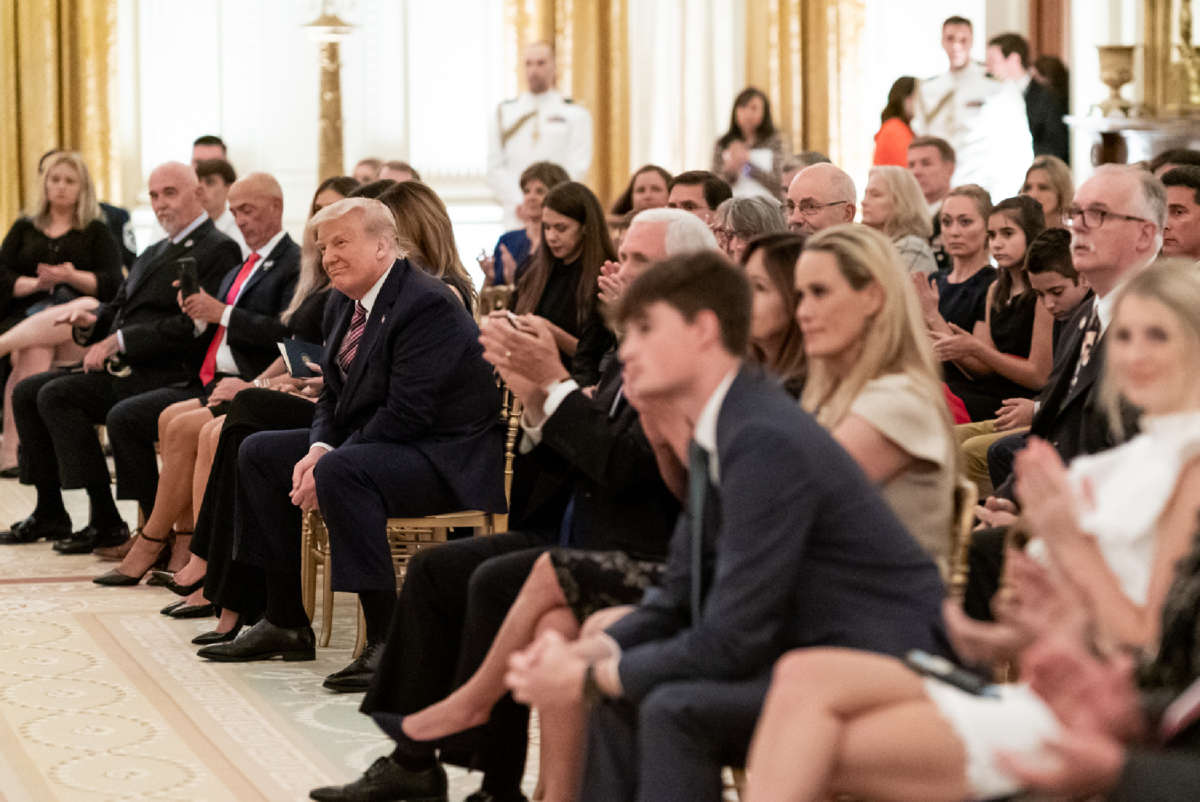Support justice-driven, accurate and transparent news — make a quick donation to Truthout today!
President Donald Trump appeared to blame his recent coronavirus diagnosis on Gold Star families — the families of military members who died while serving — during an interview on Fox Business Thursday.
Speaking with host Maria Bartiromo, Trump said he did not distance from people who wanted to tell him stories of their loved ones in the military, which may have resulted in him contracting the disease.
“They want to hug me, and they want to kiss me,” Trump said during the interview. “And they do. And, frankly, I’m not telling them to back up. I’m not doing it.”
In reality, Trump’s standard mode of operation has consistently included meeting in close quarters without a mask with groups of people — for example, he appeared unmasked at an indoor news conference with reporters at the White House on September 23 — so there appears to be no logical backing for his attempt to tie his diagnosis to the military families in particular.
The president’s comments appear to be an effort to frame the spread of COVID-19 within his administration as a consequence of patriotism rather than a refusal of Trump and his inner circle to follow basic social distancing guidelines. It’s widely believed that a Rose Garden event to announce Amy Coney Barrett as Trump’s pick for the Supreme Court was a superspreader event for the disease.
Many who were in attendance for that ceremony — which took place both outside and indoors — were not wearing masks or facial coverings. Participants were seated closely together, in violation of social distancing rules to prevent the spread of COVID-19.
“We don’t know that it’s a superspreader event for sure, but it certainly has all the makings of one,” Harvard public health researcher Joseph Allen told Vox. “When you have large numbers of people spending time in close contact, unmasked, and indoors, it’s a recipe for superspreading.”
The Rose Garden ceremony, if it is indeed a superspreader event, could have consequences that go far beyond Washington, D.C., potentially reaching across other parts of the country and putting thousands of Americans’ lives at risk.
The coronavirus has infected more than 7.7 million in the U.S. so far, including dozens of positive diagnoses being identified within or connected to the White House itself in recent days.
According to reporting from USA Today, participants from the Rose Garden ceremony traveled from various places around the nation. Because they were likely exposed to the disease, some who were there likely also spread coronavirus upon returning to their home states, and as a direct result of their attending the event.
“I don’t think we know the extent of this outbreak yet … people could die,” said Danielle Ompad, epidemiologist at New York University’s School of Global Public Health.
Trump’s deflection of responsibility for the spread of the coronavirus comes just over a month after an explosive report detailed his offensive views of veterans and members of the military.
Trump allegedly expressed negative views of people who have served, calling soldiers who died in wars “losers” and “suckers,” according to that report, which was corroborated by other media outlets immediately after it was first published.
Media that fights fascism
Truthout is funded almost entirely by readers — that’s why we can speak truth to power and cut against the mainstream narrative. But independent journalists at Truthout face mounting political repression under Trump.
We rely on your support to survive McCarthyist censorship. Please make a tax-deductible one-time or monthly donation.
